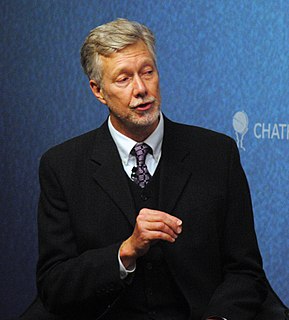A Quote by Bertrand Russell
The slave is doomed to worship time and fate and death, because they are greater than anything he finds in himself, and because all his thoughts are of things which they devour.
Related Quotes
A happy but miserable state in which man finds himself from time to time; sometimes he believes he is happy by loving, then suddenly he finds how miserable he is. It is all joy, it sweetens life, but it does not last. It comes and goes, but when it is active, there is no greater virtue, because it makes one supremely happy.
Small things such as this have saved me: how much I love my mother — even after all these years. How powerfully I carry her within me. My grief is tremendous but my love is bigger. So is yours. You are not grieving your son’s death because his death was ugly and unfair. You’re grieving it because you loved him truly. The beauty in that is greater than the bitterness of his death.
For if it is not lawful to take the law into our own hands and slay even a guilty person, whose death no public sentence has warranted. Then certainly he who kills himself is a homicide, and so much the guiltier of his own death as he was more innocent of that offence for which he doomed himself to die.
Fairy tales are loved by the child not because the imagery he finds in them conforms to what goes on within him, but because--despite all the angry, anxious thoughts in his mind to which the fairy tale gives body and specific content--these stories always result in a happy outcome, which the child cannot imagine on his own.
I have to seek God beauty. Because isn't my internal circuitry wired to seek out something worthy of worship? . True Beauty worship, worship of Creator Beauty Himself. God is present in all moments, but I do not deify the wind in the pines, the snow falling on the hemlocks, the moon over harvested wheat. Pantheism, seeing the natural world as divine, is a very different thing than seeing divine God present in all things . Nature is not God but God revealing the weight of Himself, all His glory, through the looking glass of nature.
See how he cowers and sneaks, how vaguely all the day he fears, not being immortal nor divine, but the slave and prisoner of his own opinion of himself, a fame won by his own deeds. Public opinion is a weak tyrant compared with our own private opinion. What a man thinks of himself, that it is which determines, or rather indicates, his fate.
He [the writer] must, teach himself that the basest of all things is to be afraid; and, teaching himself that, forget it forever, leaving no room in his workshop for anything but the old verities and truths of the heart, the old universal truths lacking which any story is ephemeral and doomed - love and honor and pity and compassion and sacrifice. See Poets & Writers
The religious man, the mystic, tries to explore the mystery of death. In exploring the mystery of death, he inevitably comes to know what life is, what love is. Those are not his goals. His goal is to penetrate death, because there seems to be nothing more mysterious than death. Love has some mystery because of death, and life also has some mystery because of death.



































